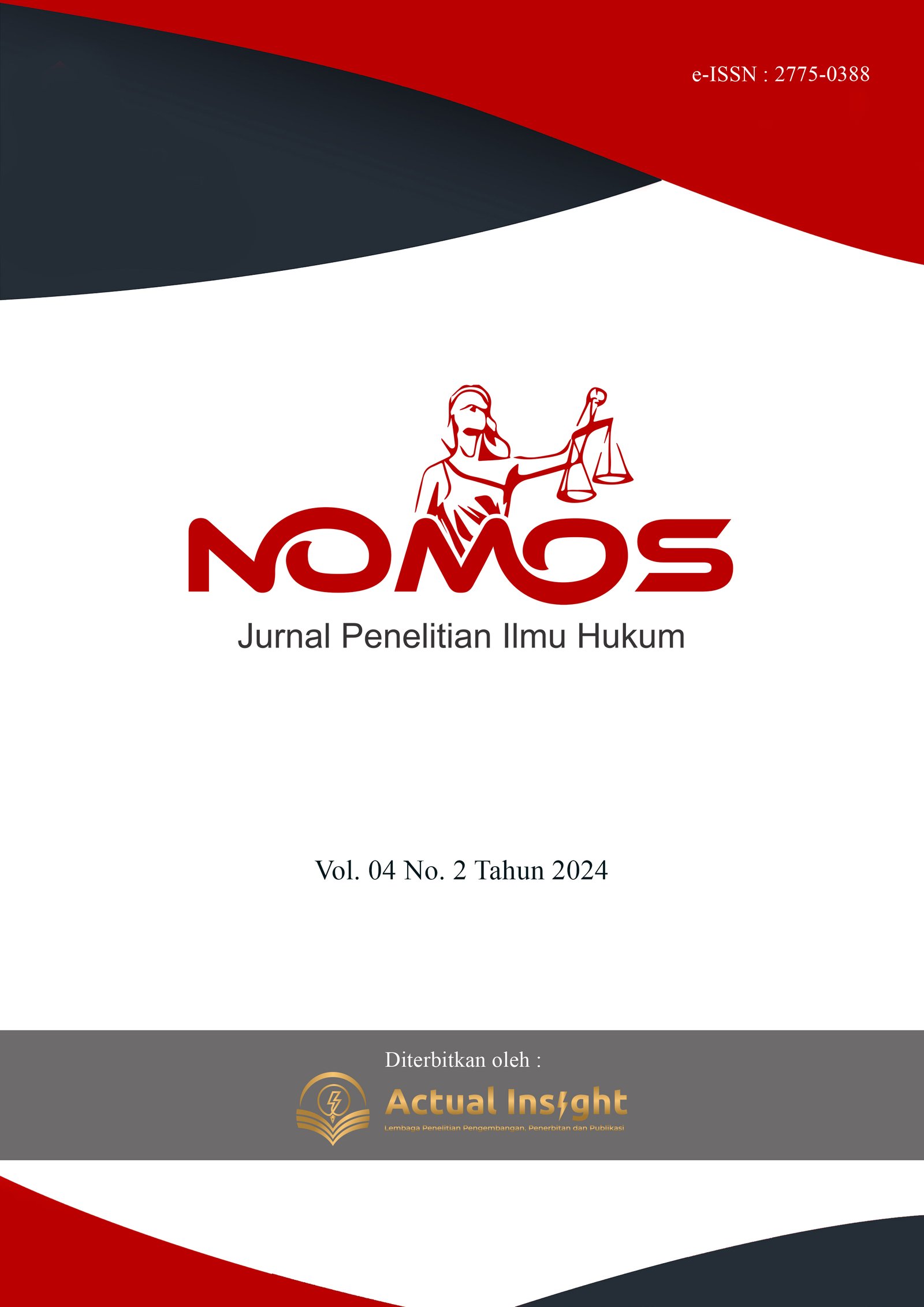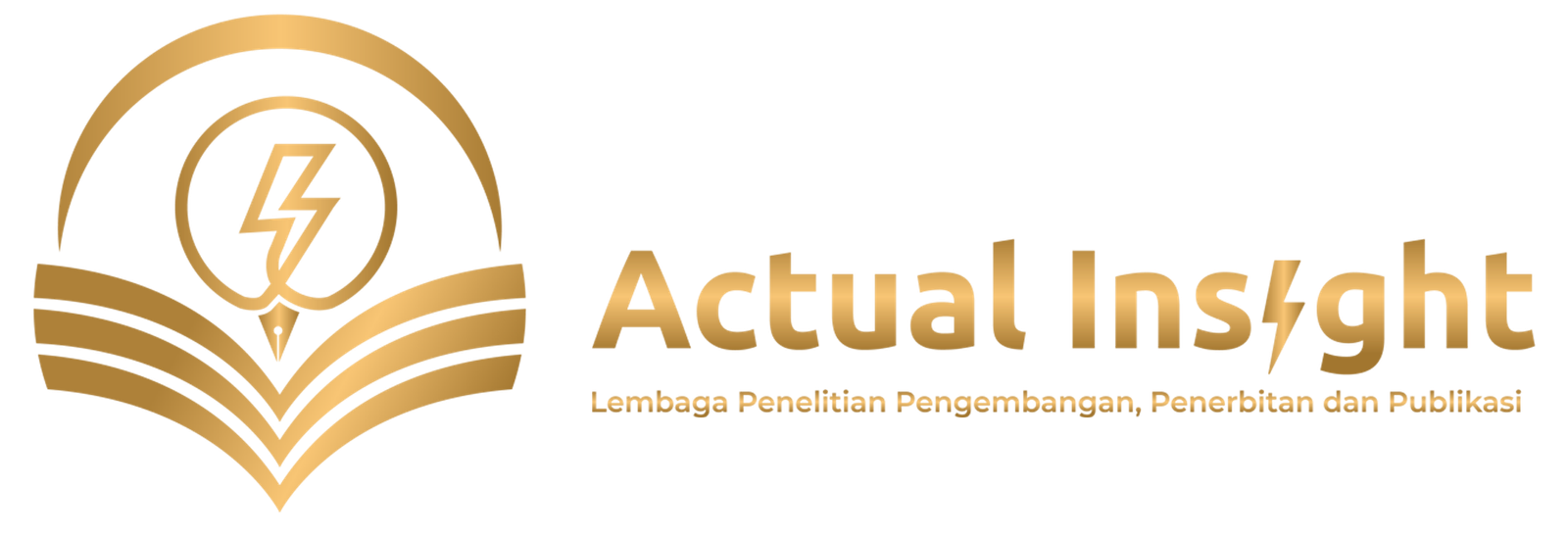

Membangun Karakter Warga Negara Digital dan Pendidikan Hukum Global Menuju Indonesia Emas 2045
-
Universitas Pendidikan Indonesia
-
Universitas Pendidikan Indonesia
-
Universitas Pendidikan Indonesia
-
Universitas Pendidikan Indonesia
-
Universitas Pendidikan Indonesia
DOI:
https://doi.org/10.56393/nomos.v4i1.2099Keywords:
-
Era globalisasi saat ini menunjukkan segala sesuatu mengalami dinamika dan perkembangan kearah digital, termasuk kewarganegaran digital yang eksis di Indonesia. Tujuan dari penelitian ini membangun karakter warga negara digital dan pendidikan hukum global yang berkualitas menuju masa depan Indonesia Emas 2045. Jenis penelitian menggunakan penelitian studi literatur. Hasil penelitian menunjukkan membangun karakter warga negara digital dan pendidikan hukum global sangat penting melalui digital literasi. Digital literasi sebagai realitas untuk dapat mengimbangi kemajuan zaman sesuai dengan kondisi global menuju Indonesia emas pada tahun 2045. Kewarganegaraan digital merupakan media yang sangat sentral dalam mempersiapkan generasi emas terutama karakternya. UNESCO menetapkan visi pendidikan kewarganegaraan global di seluruh dunia yang berfokus pada pentingnya membangun warga negara digital yang sadar literasi. Kewarganegaraan digital dalam agenda global mencerminkan komitmen terhadap pengembangan kualitas pendidikan untuk pemahaman internasional. Pendidikan kewarganegaraan digital dan pendidikan hukum global sangat penting memberikan kesempatan kepada generasi emas untuk mengeksplorasi wawasan dalam konteks yang lebih luas dengan kualitas yang berkemajuan.
-
Aktas, F., Pitts, K., Richards, J. C., & Silova, I. (2017). Institutionalizing global citizenship: A critical analysis of higher education programs and curricula. Journal of Studies in International Education, 21(1), 65–80. https://doi.org/10.1177/1028315316669815
Al-Maamari, S. (2014). Education for developing a global Omani citizen: Current practices and challenges. Journal of Education and Training Studies, 2(3), 108–117. https://doi.org/10.11114/jets.v2i3.399
Badu, S. Q. (2012). Sosok ideal manusia Indonesia generasi 2045. Yogyakarta: Konaspi VII Universitas Negeri Yogyakarta.
Banta, R. D. (2017). Innovative approaches to global citizenship education: APCEIU’s experience. Childhood Education, 93(6), 446–456. Retrieved from https://eric.ed.gov/?id=EJ1161066
Birkin, G. Hughes, T., & Brennan, J. (2014) Research and analysis of the benefits of international education opportunities. Leicester: CFE Research.
Brown, E. J. & Morgan W. J. (2008). A culture of peace via global citizenship education. Peace Review, 20(3), 283–291. https://doi.org/10.1080/10402650802330089
Brown, W. (2015). El pueblo sin atributos. La secreta revolución del neoliberalismo. Barcelona: Malpaso.
Byram, M. (2012). Conceptualizing intercultural (communicative) competence and intercultural citizenship. In Jackson, J. (Ed.), The Routledge handbook of language and intercultural communication (pp. 85–97). Abingdon: Routledge.
Caruana, V. (2014). Re-thinking global citizenship in higher education: From cosmopolitanism and international mobility to cosmopolitanism, resilience and resilient thinking. Higher Education Quarterly, 68(1), 85–104. https://doi.org/10.1111/hequ.12030
Coelho, D. P., Caramelo, J., & Menezes, I. (2022). Global citizenship and the global citizen/consumer: Perspectives from practitioners in development NGOs in Portugal. Education, Citizenship and Social Justice, 17(2), 155–170. https://doi.org/10.1177/1746197921999639
Corapi, S., & Short, K. G. (2015). November). Exploring international and intercultural understanding through global literature. Tucson, AZ: Worlds of Words. Retrieved from http://wowlit.org/links/exploring-international-intercultural-understanding-global- literature
Damayanti, I. (2019). Optimalisasi literasi digital dalam pembelajaran bahasa indonesia sebagai upaya penguatan karakter. Prosiding Seminar Nasional Fakultas Ilmu Sosial Universitas Negeri Medan.
Dewi, D. A., Hamid, S. I., Annisa, F., Oktafianti, M., & Genika, P. R. (2021). Menumbuhkan karakter siswa melalui pemanfaatan literasi digital. Jurnal Basicedu, 5(6), 5249–5257. https://doi.org/10.31004/basicedu.v5i6.1609
Dito, S. B. and Pujiastuti, H. (2021). Dampak revolusi industri 4.0 pada sektor pendidikan: Kajian literatur mengenai digital learning pada pendidikan dasar dan menengah. Jurnal Sains dan Edukasi Sains, 4(2), 59–65. https://doi.org/10.24246/juses.v4i2p59-65
Estelles, M., & Romero, J. (2016). Teacher education for citizenship in a globalized world: A case study in Spain. Journal of International Social Studies, 6(2), 21–23. Retrieved from https://eric.ed.gov/?id=EJ1149364
Estevez, K. J. (2018). Fostering global perspectives with children's literature. Kappa Delta Pi Record, 54(2), 72–77. Retrieved from https://eric.ed.gov/?id=EJ1176467
Fauzan, R., & Fitria. (2018). Digital disruption in students behavioral learning: Towards industrial revolution 4.0. Phasti: Jurnal Teknik Informatika Politeknik Hasnur, 4(2), 9-20. https://doi.org/10.46365/pha.v4i02.292
Fraser, N. (2017). Saltar del sartén para caer en las brasas. Neoliberalismo progresista frente a populismo reaccionario. In: VV, AA (eds) El Gran Retroceso. Barcelona: Editorial Planeta.
Gerzon, M. (2010). Global citizen: how our vision of the world is outdated, and what we can do about it. London: Rider Book.
Hanifah, I. & Koto, I. (2022). Perjanjian elektronik yang dibuat oleh anak dibawah umur. Legalitas: Jurnal Hukum, 14(2), 187–192. http://dx.doi.org/10.33087/legalitas.v14i2.332
Hariharasudan & Kot, S. (2018). A scoping review on digital english and education 4.0 for Industry 4.0. Social Sciences Journal, 7(227).
Harris, A. (2014). Generating global connectedness and global responsibility. Melbourne, VIC: Paper presented at the fostering global citizenship and global competence: A National Symposium.
Haynes, J. (2019). Religion, education and security: The United Nations alliance of civilisations and global citizenship. Religions, 10(1), 1–14. https://doi.org/10.3390/rel10010051
Isman, A., & Gungoren, O. C. (2014). Kewarganegaraan digital. Tojet: Jurnal Teknologi Pendidikan Online Turki, 13(1), 73–77.
Kenyon, E., & Christoff, A. (2020). Global citizenship education through global children’s literature: An analysis of the NCSS Notable Trade Books. The Journal of Social Studies Research, 44(4), 397–408. https://doi.org/10.1016/j.jssr.2020.05.001
Kurnia, M. P. (2008). Hukum internasional (kajian ontologis). Risalah Hukum, 4(2), 77-85. Retrieved from https://e-journal.fh.unmul.ac.id/index.php/risalah/article/view/262
Lase, D. (2019). Pendidikan di era revolusi industri 4.0. SUNDERMANN: Jurnal Ilmiah Teologi, Pendidikan, Sains, Humaniora dan Kebudayaan, 12(2), 28–43. https://doi.org/10.36588/sundermann.v1i1.18
Leask, B. (2015). Internationalizing the curriculum. London/New York: Routledge.
Milanovic, B. (2016). Global Inequality: A new approach for the age of globalization. Cambridge, MA: Harvard University Press.
Mulia, L. T. (2023). Kewarganegaraan digital pada era globalisasi di Indonesia. Iuris Studia: Jurnal Kajian Hukum, 4(1), 1–5. https://doi.org/10.55357/is.v4i1.321
Nasution, N., Yaswinda, Y., & Maulana, I. (2019). Analisis pembelajaran berhitung melalui media prisma pintar pada anak usia dini. Jurnal Obsesi: Jurnal Pendidikan Anak Usia Dini, 4(1), 230–236. https://doi.org/10.31004/obsesi.v4i1.311
Niens, U., & Reilly, J. (2012). Education for global citizenship in a divided society? Young people’s views and experiences. Comparative Education, 48(1), 103–118. Retrieved from https://www.jstor.org/stable/23267831
O’Dowd, R. (2017). Virtual exchange and internationalising the classroom. TLC: Journal Training Language & Culture, 1(0), 8–27.
Organisation for Economic Co-operation and Development. (2016). Global competency for an inclusive world. Author. Retrieved from https://www.oecd.org/education/Global-competency-foran-inclusive-world.pdf
Pais, A. & Costa, M. (2020). An ideology critique of global citizenship education. Critical Studies in Education, 61(1), 1–16. https://doi.org/10.1080/17508487.2017.1318772
Park, J. Y. (2016). Going global and getting graphic: Critical multicultural citizenship education in an afterschool program for immigrant and refugee girls. Special Issue: Critical Multicultural Citizenship Education, 18(1), 126–141. https://doi.org/10.18251/ijme.v18i1.1078
Pashby, K., Costa, M., Stein, S., & Andreotti, V. (2020). A meta-review of typologies of global citizenship education. Comparative Education, 56(2), 144–164. https://doi.org/10.1080/03050068.2020.1723352
Pike, G. (2008). Citizenship education in global context. In: O’Sullivan M and Pashby K (eds) Citizenship Education in the Era of Globalization. Rotterdam: Sense Publishers.
Pitaloka, D. L., Dimyati, D., & Purwanta, E. (2021). Peran guru dalam menanamkan nilai toleransi pada anak usia dini di Indonesia. Jurnal Obsesi: Jurnal Pendidikan Anak Usia Dini, 5(2), 1696–1705. https://doi.org/10.31004/obsesi.v5i2.972
Purwati, P., Darisman, D., & Faiz, A. (2022). Tinjauan pustaka: Pentingnya menumbuhkan nilai toleransi dalam praksis pendidikan. Jurnal Basicedu, 6(3), 3729–3735. https://doi.org/10.31004/basicedu.v6i3.2733
Putriani, J. D., & Hudaidah, H. (2021). Penerapan pendidikan Indonesia di era revolusi industri 4.0. Edukatif: Jurnal Ilmu Pendidikan, 3(3), 830–838. https://doi.org/10.31004/edukatif.v3i3.407
Rapoport, A., (2008). A forgotten concept: Global citizenship education and state social studies standards. The Journal of Social Studies Research, 33(1), 91–112.
Roztocki, et al. (2019). Peran teknologi informasi dan komunikasi dalam pembangunan sosial ekonomi: Menuju kerangka multidimensi. Teknologi Informasi untuk Pembangunan, 25(2), 171–183. http://dx.doi.org/10.1080/02681102.2019.1596654
Rusniati. (2015). Pendidikan nasional dan tantangan globalisasi: Kajian kritis terhadap pemikiran A. Malik Fajar. Jurnal Ilmiah DIDAKTIKA, 16(1), 105–128. Retrieved from https://jurnal.ar-raniry.ac.id/index.php/didaktika/article/view/589/492
Santoso, G. (2020). The structure development model of pancasila education (Pe) and civic education (ce) at 21 century 4.0 era in Indonesian. Proceedings of the International Conference on Industrial Engineering and Operations Management.
Santoso, G., et al. (2023). Kewarganegaraan digital di era industri 4.0: Tantangan dan peluang membangun masyarakat global yang inklusif. Jurnal Pendidikan Transformatif, 2(2).
Sassen, S. (2015). Expulsiones, brutalidad y complejidad en la economía global. Buenos Aires, Argentina: Editorial Katz.
Sastroatmodjo, S. (2012). Menanamkan nilai-nilai karakter generasi emas: Menyongsong Indonesia 2045. Yogyakarta: Konaspi VII Universitas Negeri Yogyakarta.
Scheunpflug, A. (2020). Evidence and efficacy: A compulsion for global education? In: Douglas B (ed) The Bloomsbury Handbook of Global Education and Learning. London: Bloomsbury.
Sherman, P. (2019). The cultivation and emergence of global citizen identity. Citizenship Teaching & Learning, 14(1), 7–25.
Short, K. G., & Thomas, L. (2011). Developing intercultural understandings through global children's literature. In R. J. Meyer, & K. F. Whitmore (Eds.), Reclaiming reading: Teachers, students, and researchers regaining spaces for thinking and action (149–166). New York, NY: Routledge.
Shultz, L. (2018). Global citizenship and equity: Cracking the code and finding decolonial possibility. In: Davies I, Ho L-C, Kiwan D, et al. (eds) The Palgrave Handbook of Global Citizenship Education. London: Palgrave McMillan.
Skocpol, T., & Hertel-Fernandez, A. (2016). The koch network and republican party extremism. Perspectives on Politics, 14(3), 681–699. DOI: 10.1017/S1537592716001122
Sperandio, J., Grudzinski-Hall, M., & Stewart-Gambino, H. (2010). Developing an undergraduate global citizenship program: Challenges of definition and assessment. International Journal of Teaching and Learning in Higher Education, 22(1), 12–22. Retrieved from https://files.eric.ed.gov/fulltext/EJ913525.pdf
Stoner, K., Tarrant, M., Perry, L., Stoner, L., Wearing, S., & Lyons, K. (2014). Global citizenship as a learning outcome of educational travel. Journal of Teaching in Travel & Tourism, 14(2), 149–163. http://dx.doi.org/10.1080/15313220.2014.907956
Sugiyono. (2015). Metode penelitian pendidikan (pendekatan kuantitatif, kualitatif, dan r&d). Bandung: Alfabeta.
Sulistyawan, A. Y. (2019). Urgensi harmonisasi hukum nasional terhadap perkembangan hukum global akibat globalisasi. Jurnal Hukum Progresif, 7(2), 171-181. https://doi.org/10.14710/hp.7.2.171-181
Tjitoherijanto, P. (1996). Sumber daya manusia dalam pembangunan nasional. Jakarta: UI Press.
Ulfah, T. (2020). Penguatan pendidikan karakter siswa melalui gerakan literasi digital di sekolah menengah pertama. Prosiding Seminar Nasional Pendidikan, 1(2), 727–736. http://prosiding.unma.ac.id/index.php/semnasfkip/article/view/386
UNESCO. (2015). Global citizenship education: Topics and learning objectives. Paris: UNESCO.
UNESCO. (2017). Education Transforms Lives. Paris: United Nations Educational, Scientific and Cultural Organization. Retrieved from http://tinyurl.com/y43teyka
Vaccari, V., & Gardinier, M. P. (2019). Toward one world or many? A comparative analysis of OECD and UNESCO global education policy documents. International Journal of Development Education and Global Learning, 11(1), 68–86. https://doi.org/10.18546/IJDEGL.11.1.05
Villaroya, A. A. (2016). Hacia una plutocracia global? Revista Española de Sociología, 25(1), 27–59. Retrieved from https://recyt.fecyt.es/index.php/res/article/view/65405
Wahab, A. A., & Sapriya. (2011). Teori dan landasan pendidikan kewarganegaraan. Bandung: Alfabeta.
Wang, C., & Hoffman, D. M. (2016). Are we the world? A critical reflection on selfhood in U.S. global citizenship education. Education Policy Analysis Archives, 24(0) 1–22. https://doi.org/10.14507/epaa.24.2152
Yemini, M. (2014). Internationalization of secondary education—lessons from Israeli Palestinian-Arab Schools in tel aviv-jaffa. Urban Education, 49(5), 471–498. https://doi.org/10.1177/0042085913478622
-
Downloads
Download data is not yet available.
How to Cite
Indexed by:

This work is licensed under a Creative Commons Attribution-ShareAlike 4.0 International License.














